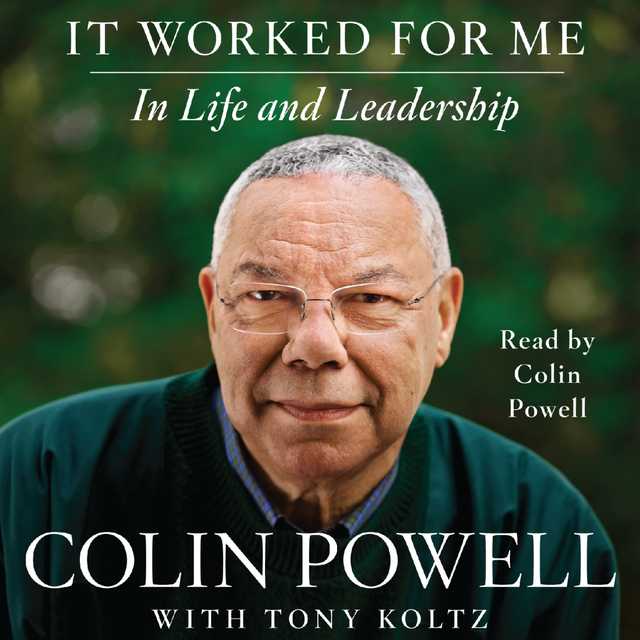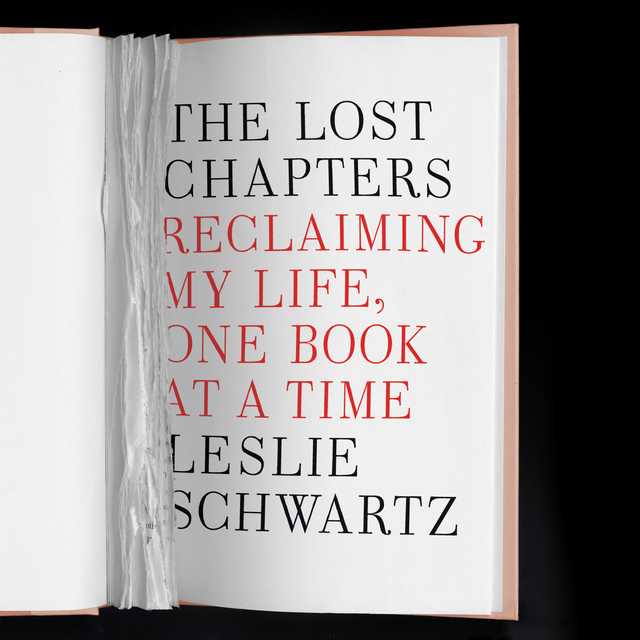It Worked For Me Audiobook Summary
New York Times Bestselling Author
Colin Powell, one of America’s most admired public figures, reveals the unique lessons that shaped his life and career
It Worked for Me is a collection of lessons and personal anecdotes that shaped four star-general and former Secretary of State Colin Powell’s legendary career in public service. At its heart are Powell’s “Thirteen Rules,”–notes he accumulated on his desk that served as the basis for the leadership presentations he delivered throughout the world.
Powell’s short-but-sweet rules such as “Get mad, then get over it” and “Share credit,” are illuminated by revealing personal stories that introduce and expand on his principles for effective leadership: conviction, hard work, and above all, respect for others. In work and life, Powell writes, “It is the human gesture that counts.”
A compelling storyteller, Powell shares parables both humorous and solemn that offer wise advice on succeeding in the workplace and beyond. “Trust your people,” he councils as he delegates presidential briefing responsibilities to two junior aides. “Do your best–someone is watching,” he advises those just starting out, recalling his own teenage summer job shipping cases of soda. Powell combines the insight he gained serving in the top ranks of the military and in four presidential administrations, as well as the lessons learned from his hardscrabble upbringing in the Bronx and his training in the ROTC. The result is a powerful portrait of a leader who was reflective, self-effacing, and grateful for the contributions of every employee, no matter how junior.
Powell’s writing–straightforward, accessible, and often very funny–will inspire, move, and surprise readers. Thoughtful and revealing, his book is a brilliant and original blueprint for leadership.
Other Top Audiobooks
It Worked For Me Audiobook Narrator
Colin Powell is the narrator of It Worked For Me audiobook that was written by Colin Powell
Colin Powell was born in New York City in 1937. He was a retired four-star general in the United States Army and earned numerous military, civilian, and foreign honors. He served four presidential administrations in a variety of roles, most recently as Secretary of State from 2001 to 2005.
About the Author(s) of It Worked For Me
Colin Powell is the author of It Worked For Me
More From the Same
- Author : Colin Powell
- The America I Believe In
- Publisher : HarperAudio
- Abraham
- American Gods [TV Tie-In]
- Dead Ringer
- House of Sand and Fog
- Prey
It Worked For Me Full Details
| Narrator | Colin Powell |
| Length | 7 hours 41 minutes |
| Author | Colin Powell |
| Category | |
| Publisher | HarperAudio |
| Release date | May 22, 2012 |
| ISBN | 9780062135155 |
Subjects
The publisher of the It Worked For Me is HarperAudio. includes the following subjects: The BISAC Subject Code is Business & Economics, Leadership
Additional info
The publisher of the It Worked For Me is HarperAudio. The imprint is HarperAudio. It is supplied by HarperAudio. The ISBN-13 is 9780062135155.
Global Availability
This book is only available in the United States.
Goodreads Reviews
Jay
September 05, 2012
Chapter 35: February 5, 2003This is the chapter wherein Colin Powell recaptures my respect.The date – February 5, 2003 – which for Powell is so seared into his consciousness that it is the equivalent of other folks’ memories of the day Kennedy was shot or when they first heard of the planes flying into the Trade Center. For Powell, 2/5/03 marked his appearance before the UN to make the Bush Administration’s case that a pre-emptive strike against Iraq was warranted by Saddam’s possession of Weapons of Mass Destruction. Though his apology is somewhat hedged, Powell gives vivid insight into the constrains and forces that led to, in his term, the “most major failure” in a military and public life that spanned five decades. No surprise that Cheney’s hands were all over the manipulation that enmeshed Powell! While Powell is too much a soldier and class act to “name names.” It is clear that the neo-conservative junta -- Rumsfeld, Cheney and Wolfowitz – are probably not on Alma and Colin’s Christmas Card list. Like in the excellent “Art of Intelligence” (reviewed here in late August ’12), George W. Bush is presented as a better man than those supposedly serving him from this gang.The rest of the book is fairly straightforward leadership 101. Having worked with a number of retired Army Generals, I am again reminded of what an excellent leadership crucible today’s military is. Here, again, we are reminded that the failures of leadership, execution and even simple common sense are nearly all at the feet of our political leaders and rarely in this most recent generation of military. Our troops deserve so much better than a repeat of Republican bellicosity.
Janine
December 29, 2021
It Worked for Me: In Life and Leadership - Rule 1: “It ain’t as bad as you think. It will be better in the morning.”- “Always show more kindness than necessary because the person receiving it needs it more than you will ever know” - a priest - The day you stop solving problems is the day you stop leading - Leaders need to be at a place to influence action (then get out of the way)- The troops will never let you down if you don’t let them down. Prepare them.- Know when it’s time to leave and be gone.- Be decisive.
Stephen
April 03, 2013
I listened to the Audible.com verison of this book, read by General Powell.First, General Powell writes in a very straight-forward, simplistic, way. You can tell he isn't a "trained" writer. Nor is he a brilliant performer reading it. You can frequently hear edit breaks, and voice tone changes. Honestly, none of this bothered me. There were a number of things in this book that I really enjoyed. His rules are well-known now, and quite good. It was interesting to hear his take on them. I really appreciated his view that you need to actually walk around and get a feeling for what is going on when leading; that you cannot rely on presentations and prepared talks.A few things seemed entirely trite though. I really don't give a damn what kind of hotel room he likes, or what sort of limo and driver he requests when speaking professionally. But those bits passed quickly. This was definitely worth a read/listen.
Joseph
May 20, 2015
I loved it. Clear. Concise. Plenty of humility. A lifetime of lessons and principles, all placed in a easily understood, frequently humorous and revealing read that I wish I had 30 years ago. Highly recommend it for anyone, not just those in the military.
Melissa
May 30, 2013
I love Colin Powell, I think he is such an excellent example of what America should be. I have been wanting to read this book for awhile and downloaded it to listen to on my commute. First, it was read by Colin Powell himself, which I appriciated. Second, I really enjoyed his approach to leadership through an army perspective. One of the things he discussed was that "not everybody gets promoted". In the army, there are potentially a lot of soliders who have the skills and capacity to be generals, but there are simply not enough spots. The army is okay with that, but other areas of government and the private sector are not. Creating jobs just so that people can get promoted is inefficent. I have never heard it put like that before, but I think it describes government bureaucracy very well, Another part of this book I enjoyed was "don't be a busy bastard", meaning, don't be the person at work who is constantly working late into the night and on weekends. Powell stressed a work life balance, and said that people (especially bosses) who work around the clock create an environment where everybody feels they have to work around the clock. When everbody feels like they have to work around the clock, they start making up work for them to do to fill the time. What is created is an office full of overworked people, doing work they don't really need to be doing. By limiting your hours at work, you are forced to prioritize tasks and be effecient during the time you are there. I loved this.
AnnieM
February 13, 2022
July 18-July20, 2015Yep another reread. I finally bought my own audio copy of the book. I figure once I've read a book more than three times, I need to own it. Colin grounds me. His 13 rules helps me get through the days. One of the best management books I've read, and I've read a lot. Sept 17-Sep19, 2014Two years after I listened to it the first time and it resonates with me even more. I experienced much less dull bits and could identify with parts more now that I did before. I will definitely have to buy it. Oct 2012-November 2012I won't lie, there are some seriously dull bits in this. However, I love finding out that Colin Powell is a street kid. He's a regular guy that feels he could change the world through his Hot Dog Diplomacy. He talks of family, life, military and how he got here. I really enjoyed the book. I look forward to buying a copy and reading and marking it up. Now I think this book will only truly strike a cord with a very specific person possibly at a specific point in one's life. Leadership, common sense, and history mesh together for a well narrated book.
Deacon Tom
May 28, 2020
Absolutely outstanding. As a former Air Force Commander, I completely concur with his comments on leadership.
Nikki
July 16, 2022
I've owned this book for like 6 years when I met the now late Colin Powell and he signed my book, but I was waiting for the right time to read it. Well, a new job coming up was the perfect time, and I'm glad I did. Great book on leadership and interesting anecdotes from his life and career. Definitely recommend!
Jay
September 03, 2022
Great book. He has a wonderful way of sharing his perspective and the lessons he learned along the way in his distinguished career
Saza
August 04, 2015
Great reading with some interesting points on leadershiphighly recommend it....
Justin
November 28, 2019
It Worked for Me: In Life and Leadership by Colin Powell.This book is another off the list of books by Secretaries of State. Colin Powell's leadership books have been recommended by many others. The first person I read who mentioned him frequently was Bill Hybels in his leadership book Axiom.He's remarkable in that he attained the highest rank in the U.S. Army despite not having attended West Point or other school that turns out military greats-- mainly due to racial discrimination. He is not bitter, this experience just fuels his passion for funding education initiatives and his stalwart support of public education.He has both commanded and served, and one weakness of the book is that he does not write as much on how to be a subordinate as he does on leading. But he has anecdotes no one else could possibly have. One refreshing aspect of the book is Powell's self-deprecating humor. He takes his work and his role very seriously, but never takes himself too seriously. He really does come across as down-to-earth; he claims to fly coach and such.He begins with the "13 Rules," which actually came out of a 1989 interview with him. When the interviewer went back for some more colorful insights, Powell shared some quotes and anecdotes that he collected under his glass-top desk, and then they went viral. It ain't as bad as you think. Get mad, then get over it. (don't burn bridges) Avoid having your ego so close to your position that when your position falls, your ego goes with it. It can be done. Be careful what you choose. You may get it. Don't let adverse facts stand in the way of a good decision. You can't make someone else's choices. Check small things. Share credit. (but always take the blame) Remain calm. Be kind. Have a vision. Don't take counsel of your fears or naysayers. Perpetual optimism is a force multiplier.Powell explains and gives stories for many of these rules, and the rest of the book shares other insights. Here is what I gleaned, personally: President Bush '43 really did read all the books he claims to have read. Powell writes that staffers were always sneaking weird books into Bush's personal bag on the weekends and everyone would be amused when Bush would be carrying on about some obscure study found in them on Monday. Powell regrets some aspects of his time in the Bush Cabinet but does mention AIDS in Africa and better relations with China, Russia, and others as unsung victories.On serving under others, Powell says "If you work for the king, give the king his due...If you take the King's shilling, you do the King's work...Always give the King his due first." In other words, be loyal, do your best, and after you've satisfied your boss then you can do what you want. Do what he wants first and quickly so that you have more time for what you want to do.Put others ahead of yourself, and always treat others with dignity. Kindness matters and pays dividends.Don't be a "busy bastard" it's crucial to have a life, create a balance. Bosses that work around the clock create an environment that everyone else needs to as well. Then people start making up things to do even if they are not necessary. Don't do busywork.Powell always wants as much information as possible and let him sift through it. He has developed a talent for spotting real and fake and filtering information quickly, akin to Malcolm Gladwell's Blink. I'm not sure I trust that in every leader. Powell himself writes that he questions himself repeatedly as to whether his instincts failed him when examining the CIA's National Intelligence Estimate, which he relied on in making the case for war with Iraq at the U.N. He questions whether he had blinders on. He maintains he did not intentionally mislead anyone, they just didn't have the facts, and he "wishes he had answers" to the myriad questions that critics have asked. While Powell takes full blame ("always share the credit and take the blame") he does make some references to Scooter Libby and the Vice President's office for delivering a draft of his U.N. speech intended to be like a legal brief, which Powell rejected because it lacked any substantiation or even connection to what was "known" in the NIE. Rejected the draft, his staff wrote their own in 4 days."If a spy tells you exactly where a target is, he's out of a meal ticket" -- he points out about the failed attempt on Saddam Hussein at Dora Farms to open the Iraq War. Intelligence is helpful, but unreliable for this reason. However, Powell writes that perhaps the Administration relied too much on its own optimism and not on experts in the field on considering the consequences of invading Iraq. Powell is glad that Saddam was toppled but angry at how little attention was spent on post-war, the Bush Administration expected to stand up a fully-functioning democracy within 90 days of toppling the regime, he writes. The "Pottery Barn rule" of "you break it, you own it" was not his, and Pottery Barn has no such rule and was angry at him for it, but he likes it."Good leaders make good managers and good managers make good leaders." I disgree with Powell here. Some people are automatically made a leader by their authority, and they may lead in terms of personal integrity, work ethic, and more but be terrible at managing others and terrible at communication.Powell pushed the military and the State Department on technology. He's a geek with several iPads and computers on his desk. He claims to have upgraded the State Department from 1945 to 2001, and I know that his Diplomatic Readiness Initiative (which barely gets mentioned in the book) greatly expanded the Foreign Service's capabilities. One good story on the Foreign Service: Powell once had low-level desk officers brief the President on Mexico instead of more senior officers. He knew the desk officers actually spoke Spanish, knew what was happening on the ground, and also knew they would work hard to get the info. He also knew the senior staff would be relying on junior officers reports anyway. Always rely on your "man in the field," he writes, but not necessarily your paid spy, see above.Interestinly, Powell keeps his family at a distance from hi work life. He doesn't share stories from work or office gossip with his wife. He learned this from a commanding general who had to replace men whose wives had started to interfere in the decision-making process.Leaders should face the facts and never shoot the messenger.Oddly, Powell doesn't mention anything about reading material. What books does he read? For speaking engagements he researches the company so thoroughly "I could apply for a job there," but there are no books mentioned other than Clausewitz and Sun Tzu.The famous "Powell Doctrine" of overwhelming force is not found in any military manual or course and Powell prefers "decisive force" to "overwhelming force."He does have a helpful segment on succeeding another leader and how to hand off command to another. Hand it off and let it go. Your best ideas will go down the tube and you'll hear complaints from former employees about how much they missed you. But encourage them to stick with the new man. Likewise, give the man before you credit for doing his job, assume he did his job, take the hand you're dealt and own it yourself. Don't complain like politicians do that the current predicament is someone else's fault.Troops only go up the hill for a leader they trust, one who has integrity and moral courage. Be that guy, and be the one who fosters trust both vertically and horizontally in your organization.Powell developed personal relationships with world leaders and is especially proud of his friendship with Princess Di. He closes book with autobiography of his education and his current passions and activities.Another weakness of the book is that there is not much on conflict resolution, dealing with difficult employees or bosses. Judging from Condoleeza Rice's memoir, Powell did not do a good job of resolving conflicts between himself and others in the White House, so perhaps that's a personal weakness. He also has very little marital advice outside the above.In all, I give this book 4.5 stars out of 5.
Paul
November 10, 2021
Wow. This was an incredible book; probably the best I've read in 2021. While timely due to Colin Powell's recent passing, it gave me countless insights into my own life and career. While starting with his famous 13 Rules, I found the entire book to offer exceptional advice for any leader - military or civilian. Not sure if a younger person in their 20s would grasp some of the advice, but after a few decades of work experience the examples in the book were easy for me to connect to some past job of mine thus wish I had read it sooner. A few highlights are below.- The role of the Secretary of State is principle foreign policy adviser to the president, not highest ranking roving ambassador. Surely modern communications made it possible to conduct diplomacy without flying off to meetings all over the world. p54 PJK: Interesting and clear definition of the SecState’s role. It's always nice to have a clear mission for any job that you may have. This insight will make me think differently when I hear about the SecState's actions/travel in the future.-A commander is decisively engaged when he is in a win or lose situation and has lost freedom of movement. The point of decision might be a television show explaining to the world the revolutionary new product you are getting ready to unveil or why you over invested in complex derivatives or subprime investments. p57 PJK: excellent definition of a leader needing to be in the right place and time... and to hopefully never lose that freedom of movement. -The cabinet assembles in the cabinet room. Media come in, listen to the president discuss whatever subject interests them that day, and then leave. P182 PJK: Have often wondered about such Cabinet meetings. Never really knew what they accomplished... and now I understand that it is more of a show vs an action event. -Diplomacy that does not also imply the prospect of force may not be effective. Without a clear political objective, you can't make analysis of the required force. p202. PJK: Once again, some clear wisdom if operating in the international community. -Kabul in Baghdad fell quickly. We had taken out the governments, but the lack of clear and achievable follow on objectives, or the means to achieve them, turn the later phases into failures that took years and substantial surge forces to begin to reverse. p207 PJK: This section made me wonder how different my life would be if the planning and objectives had been different in 2002-2005.
Most Popular Audiobooks
Frequently asked questions
Listening to audiobooks not only easy, it is also very convenient. You can listen to audiobooks on almost every device. From your laptop to your smart phone or even a smart speaker like Apple HomePod or even Alexa. Here’s how you can get started listening to audiobooks.
- 1. Download your favorite audiobook app such as Speechify.
- 2. Sign up for an account.
- 3. Browse the library for the best audiobooks and select the first one for free
- 4. Download the audiobook file to your device
- 5. Open the Speechify audiobook app and select the audiobook you want to listen to.
- 6. Adjust the playback speed and other settings to your preference.
- 7. Press play and enjoy!
While you can listen to the bestsellers on almost any device, and preferences may vary, generally smart phones are offer the most convenience factor. You could be working out, grocery shopping, or even watching your dog in the dog park on a Saturday morning.
However, most audiobook apps work across multiple devices so you can pick up that riveting new Stephen King book you started at the dog park, back on your laptop when you get back home.
Speechify is one of the best apps for audiobooks. The pricing structure is the most competitive in the market and the app is easy to use. It features the best sellers and award winning authors. Listen to your favorite books or discover new ones and listen to real voice actors read to you. Getting started is easy, the first book is free.
Research showcasing the brain health benefits of reading on a regular basis is wide-ranging and undeniable. However, research comparing the benefits of reading vs listening is much more sparse. According to professor of psychology and author Dr. Kristen Willeumier, though, there is good reason to believe that the reading experience provided by audiobooks offers many of the same brain benefits as reading a physical book.
Audiobooks are recordings of books that are read aloud by a professional voice actor. The recordings are typically available for purchase and download in digital formats such as MP3, WMA, or AAC. They can also be streamed from online services like Speechify, Audible, AppleBooks, or Spotify.
You simply download the app onto your smart phone, create your account, and in Speechify, you can choose your first book, from our vast library of best-sellers and classics, to read for free.
Audiobooks, like real books can add up over time. Here’s where you can listen to audiobooks for free. Speechify let’s you read your first best seller for free. Apart from that, we have a vast selection of free audiobooks that you can enjoy. Get the same rich experience no matter if the book was free or not.
It depends. Yes, there are free audiobooks and paid audiobooks. Speechify offers a blend of both!
It varies. The easiest way depends on a few things. The app and service you use, which device, and platform. Speechify is the easiest way to listen to audiobooks. Downloading the app is quick. It is not a large app and does not eat up space on your iPhone or Android device.
Listening to audiobooks on your smart phone, with Speechify, is the easiest way to listen to audiobooks.






























